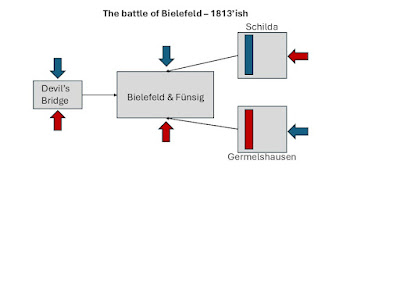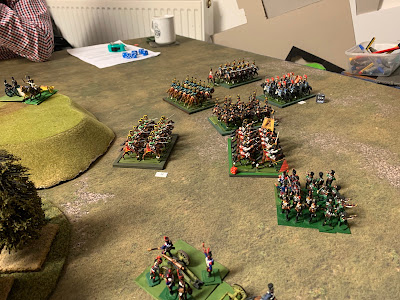The overall game
The battle of
Bielefeld is a fictional battle fought during 1813 between the French and a
Grand Collation of its enemies. In the first round three battles take place
which are the approach battles for the main action at Bielefeld. The outcome of
each battle has an impact on the later game.
Each of the 6 armies contains; 10 infantry in 3 brigades, 6 cavalry in 2 brigades and supporting artillery / light troops. Three of the units may be designated as Veterans.
Units that are damaged, but survive the battle, are restored at full strength for the main battle. Units who are routed / destroyed must dice;• Line
Infantry : 1 - 3 they begin with 2 damage and 4 - 6 they begin with 1 damage.
• Other
units: 1- 4 they begin with 1 damage and 5 - 6 they begin with no damage.
• Remember
you can try to recover some of these loses during the game.
Devil’s Bridges winner = half that army may begin as a flank attack that arrives after D3 turns.
Schilda / Germelshausen = if the Defender wins then the Attackers army is delayed by D3 turns for the main battle and must march onto the table.
Devil's Bridge - French vs Russian encounter to determine the flank attack
 |
| French left |
 |
| Russian right |
They flooded units across the bridges, which took fire but managed to establish a bridgehead. The Russians focused on maximising the shooting damage but were unable to retake the crossings. So a French Win and they got to have a flanks march in the large game.
 |
| The French bridgeheads |
Germelshausen - French attack vs Prussian defence to delay the attackers
The French deployed with their infatry mostly attacking the village and nearby woods and their cavalry in the more open ground to the east.
 |
| Prussian defenders await the attack |
After a short struggle they were able to overrun the village and threaten the second objective nearby.
 |
| The village falls to the French |
Prussian reserves arrived in time to stabilise the line, but in the final turn the French could still win if they were able to rout the defenders of the second objective. They cane close but could nt quite make it so the game was a close draw.
 |
| Prussians hold in the last round |
Schilda - Austrian attackers vs French defenders to delay the attackers
The French stretched out across the field so the Austrians attacked solely down the flanks with combined arms attacks on both sides. The French sought to disrupt this with spoiling attacks from their cavalry.
 |
| Austrian right |
 |
| Austrian left |
The French horse made limited impact on the Austrian foot but did delay them enough for force a Draw.
 |
| French spoiling attack |
Bielefeld - encounter game aiming to hold 3 of the 4 objectives.
 |
| Austrians take the heights |
The Coalition won the initiative, which enable them to grab most of the objectives in the first turn and especially the village and town. For most of the game a Russian brigade around the village was able to hold off three French brigades and so tie-up half the French army.
 |
| Russians grab the village |
Centrally it was a grinding match with town being taken and retaken through the game and neither side able to hold all of it for very long. Around the heights the small French force make a nuisance of itself and was able to at least contest the objective as the Austrians placed their lacked the infantry support to clear the woods at the bottom of the hills.
 |
| The village finally falls to the French |
The game ended with each side holding an objective and two contested so a Draw. The French probably had the stronger forces left but has been unable to rapidly take Funsig and exploit the flank attack.











Wonderful to see Roy's Hinton Hunts back in action - vive l'empereur!!!
ReplyDeleteThe smaller footprint of 20mm was helpful for this large game.
ReplyDelete